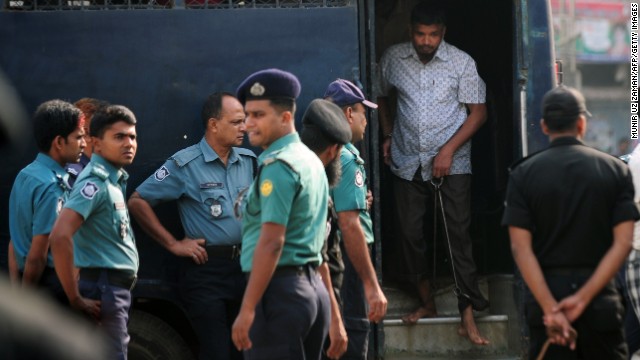By Brian Lanciault
Impunity Watch Reporter, Asia
DHAKA, Bangladesh–A special court in Bangladesh sentenced 152 soldiers to death Tuesday for participation in a 2009 military mutiny in which dozens of military officers were massacred. Human rights groups have criticized the mass trial, claiming that the process falls well below the international legal standard.

At the special court in Dhaka on Tuesday, Judge Mohammad Akhtaruzzaman sentenced an additional 157 people, mostly border guards, to life in prison for their role in the 33-hour mutiny, while another 271 soldiers were acquitted.
“The atrocities were so heinous that even the dead bodies were not given their rights,” Akhtaruzzaman said as he started to read out the verdicts.
Approximately 823 soldiers were alleged to have taken part in the killing of 74 people, who were hacked to death or tortured and burnt alive, then dumped in sewers and shallow graves.
Security was tight at the specially-built court in Dhaka, with police and the elite Rapid Action Battalion (RAB) officers deployed outside, before the verdict’s announcement.
Prosecutors had sought the death penalty for a majority of the 823 soldiers charged with murder, torture, conspiracy and other offences over the mutiny that started at the paramilitary Bangladeshi Rifles (BDR) headquarters in Dhaka.
Nearly 6,000 soldiers have already been jailed by dozens of special courts over similar events that spread from the Dhaka headquarters to other BDR bases around the country.
The 823 soldiers were selected for prosecution in a civilian court after they were found guilty before military courts for their role in the mutiny.
At least twenty-three civilians have been charged with criminal conspiracy.
Baharul Islam, the lead prosecutor, said the case was the largest of its type in the world, with hundreds of witnesses participating in the trial that started in January 2011 and finished in October this year.
“So far as we know it’s the largest case in the world’s history. There were 654 prosecution witnesses,” Islam said before the verdict.
The verdict was delayed last week after the judge said he needed more time to finish writing it.
During the uprising, the mutineers stole an estimated 2,500 weapons and broke into an annual meeting of top BDR officers before opening fire on them at point blank range.
As the mutiny spread, it posed a serious threat to the new government of Prime Minister Sheikh Hasina, who had been elected only one month previously.
The cause of the violence is uncertain but pent-up anger over poor benefits and resentment by soldiers against BDR senior officers has generally been considered as the main factor.
New York-based Human Rights Watch criticized the Bangladesh authorities for the mass trial, saying it would not ensure justice, and suggested that the trial implicated grave violations of the International Covenant on Civil and Political Rights.
The group says the violations include torture and other abuse while in custody in order to extract confessions and statements.
Human Rights Watch reported at least 47 suspects had died in custody while the surviving suspects have had limited access to lawyers, and to knowledge of the charges and evidence against them.
“Trying hundreds of people en masse in one giant courtroom, where the accused have little or no access to lawyers is an affront to international legal standards,” said Brad Adams, Asia director at Human Rights Watch, in a statement on Oct. 29.
Those sentenced to death are set to be hanged to death, though no time frame has been established. Defense attorneys for several of the convicted have already begun the appeals process.
For more information, please see:
Reuters– Bangladesh court sentences 152 to death for 2009 mutiny — 5 November 2013
Al Jazeera– Bangladesh sentences hundreds to death, life in prison in mutiny verdict — 5 November 2013
CNN– 152 soldiers sentenced to die for mutiny in Bangladesh — 5 November 2013
Gulf News– Bangladesh court sentences 150 former soldiers to death — 5 November 2013